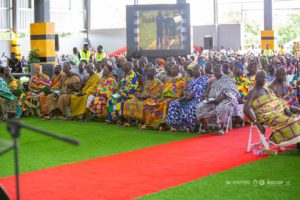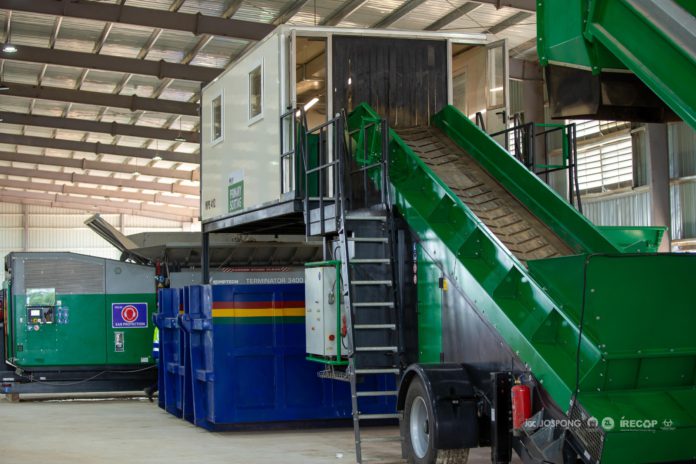Minister of Sanitation and Water Resources, Lydia Seyram Alhassan, has commissioned Zoomlion’s transformative Integrated Recycling and Compost Plant at Sunyani in the Bono Region.
Addressing the colourful durbar of chiefs, people, and departmental heads of state institutions at Nwawasua near Sunyani, the Minister, who is also the Member of Parliament for the Ayawaso West Wugon Constituency took the opportunity to praise the chiefs and people of the Bono Region touting the resilience of the region in always keeping their environment clean.
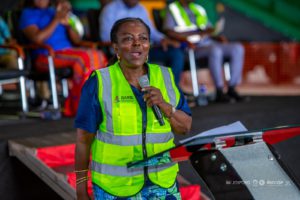
She said when it comes to cleanliness Bono Region, particularly Sunyani is always clean by all standards.
She believes that it was partly because of the concern and frantic efforts taken by the traditional rulers and the people themselves to maintain a clean environment.
Ms Lydia also mentioned that the time has come for Ghana to celebrate the successes chalked in waste management infrastructural transformation following Jospong Group’s construction of 16 waste treatment and recycling plants across the regions in the past four years with 10 of them being operational while six are at various levels of completion.
She showered praises on the Executive Chairman and the entire management and staff of the Jospong Group of Companies for transforming the waste management industry of Ghana.
According to her, the strategic establishment of the Ministry of Sanitation and Water Resources by the President, H. E. Nana Addo Dankwa Akufo-Addo to spearhead policy formulation and create an enabling environment for the private sector to thrive towards a cleaner Ghana was anchored by the likes of Dr Joseph Siaw Agyepong.
This has resulted in the many waste infrastructure springing up in Ghana today.
The Minister further appealed to the people of Sunyani to embrace the facility and channel their waste to it for processing and recycling especially composting the organic waste for agricultural purposes and the recycling of plastics for household and recreational uses.
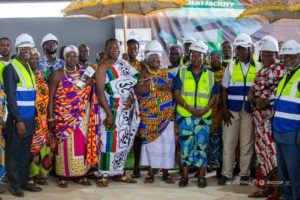
Minister Ophelia Mensah Hayford of Environment, Science, Technology, and Innovation (MESTI) and Member of Parliament for Mfamsipim stated that global warming is a significant contributor to climate change, impacting the environment.
She highlighted that the initiatives by the Jospong Group of Companies exemplify effective climate change mitigation.
She was not surprised that, due to these efforts, the Swiss government invited Ghana to participate in the carbon trading market, which is anticipated to boost the country’s economy.
Madam Hayford encouraged Ghanaians to actively combat indiscriminate waste disposal and other practices contributing to climate change.
The Executive Chairman of the Jospong Group of Companies, Dr. Joseph Siaw Agyepong, reminisced about the modest beginnings of Zoomlion Ghana Limited, which started in Bolgatanga with just a manual tricycle.
He attributed the company’s growth to prayers, commitment, and resilience, expressing gratitude to God.
Dr. Agyepong thanked the chiefs and people of the Bono Region, particularly the Nwawasua Chief and Queen Mother, for providing land for a new facility serving the entire Bono Region.
Reflecting on Ghana’s history, Dr. Agyepong compared the current industrialization efforts to those led by Nkrumah in the 1960s, which significantly boosted the economy.
He expressed support for President Nana Addo’s One District, One Factory (1D1F) initiative, seeing it as a means to industrialize Ghana and expand opportunities in sectors where he excels.
The new facility, set to produce 150,000 tons of organic fertilizer annually, aims to enhance agriculture in Bono Region and nationwide.
Dr. Agyepong sees waste as a “misplaced resource” and encourages others to repurpose waste into valuable assets.
He assured that the facility would include a research center for local tertiary institutions to study waste components and applications, promising that most workers would be locally employed.
The Bono Regional Minister, Justina Awo Owusu-Banahene, lauded President Nana Addo Dankwa Akuffu-Addo and Dr. Joseph Siaw Agyepong for situating the facility in her region, anticipating it would create jobs and process regional waste efficiently.
She noted that the plant could handle up to 400 tons of waste per day, aligning with the region’s daily waste generation.
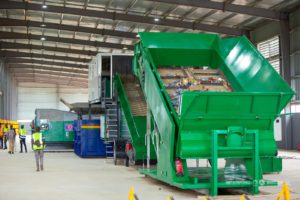
This plant is expected to foster tourism and other opportunities in the region.
Additionally, the facility will include 1,000 motor kings from Jospong for waste collection in Sunyani, providing jobs for many young people.
